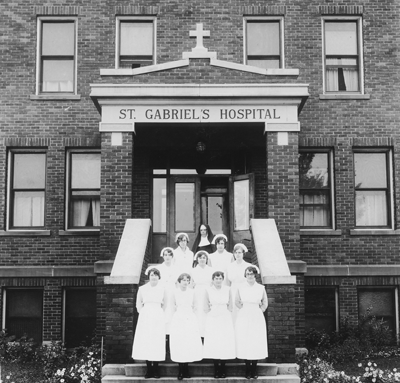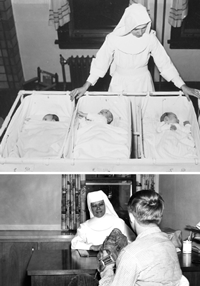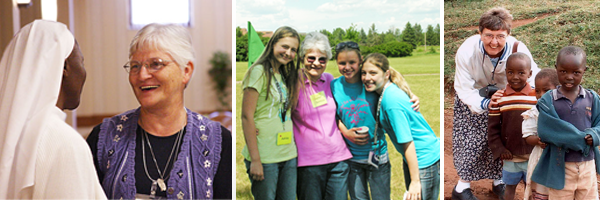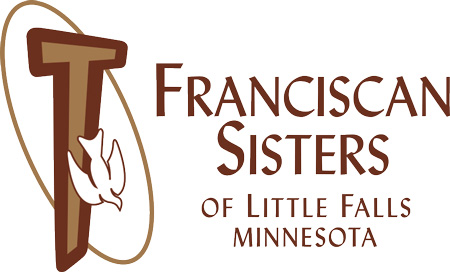Living the Gospel Courageously
Franciscan Sisters of Little Falls Minnesota
Our Community Today
Our History
 The Franciscan Sisters of Little Falls, Minnesota, is a Roman Catholic congregation of religious women of the Third Order of St. Francis of Assisi. Our community was founded in central Minnesota in 1891 by sixteen women who had previously been members of another Franciscan congregation. In God’s providential plan, these women, having lost contact with their original foundress who had become ill in Rome, received permission from the Bishop of the St. Cloud Diocese to become a congregation under his jurisdiction. Having been granted a piece of land on the south side of Little Falls, the sisters, with the help of generous benefactors, constructed a building that immediately served as a residence for orphan children, a hospital, a home for the aged, and a convent for the sisters. From these simple beginnings, the sisterhood flourished and continued to develop ministries in health care, education, and social services throughout Minnesota and into Wisconsin. Eventually the sisters’ desire to serve others and to promote the Gospel carried them to places throughout the United States and to other continents, notably South and Central America and Africa.
The Franciscan Sisters of Little Falls, Minnesota, is a Roman Catholic congregation of religious women of the Third Order of St. Francis of Assisi. Our community was founded in central Minnesota in 1891 by sixteen women who had previously been members of another Franciscan congregation. In God’s providential plan, these women, having lost contact with their original foundress who had become ill in Rome, received permission from the Bishop of the St. Cloud Diocese to become a congregation under his jurisdiction. Having been granted a piece of land on the south side of Little Falls, the sisters, with the help of generous benefactors, constructed a building that immediately served as a residence for orphan children, a hospital, a home for the aged, and a convent for the sisters. From these simple beginnings, the sisterhood flourished and continued to develop ministries in health care, education, and social services throughout Minnesota and into Wisconsin. Eventually the sisters’ desire to serve others and to promote the Gospel carried them to places throughout the United States and to other continents, notably South and Central America and Africa.
 Character of Life
Character of Life
The life of a Franciscan is characterized by simplicity and a profound reverence for all created things. Acknowledging God the Creator as the source of everything that is, Franciscans accept life and everything God created as gift. Franciscans recognize in other human beings and in all created things the reality of common unity. Thus they walk joyfully and gently on the earth with deep respect for all people and all things. Like Francis and Clare and the early Franciscans, they approach others in a spirit of peace and reconciliation, manifesting in word and example their commitment to following in the footprints of Jesus Christ.
Our Community Today
The Franciscan Sisters of Little Falls, Minnesota, is a Roman Catholic congregation of women religious of the Third Order of St. Francis of Assisi. We dedicate ourselves to living the Gospel joyfully through the Franciscan values of conversion, contemplation, poverty and minority.
We are committed to a life of prayer, simple living, and service to those in need. We are dedicated to promoting human rights, building community wherever we live, and healing the sources of Mother Earth's wounds.
While the majority of our sisters live and minister in Minnesota, some serve in California, Texas and Wisconsin. We also have sisters serving our mission in San Rafael, Mexico.
Franciscan Associates assist us in extending the Franciscan values and way of life while remaining in their own committed lifestyles. Following in the footprints of Jesus Christ and stirred by the same Spirit that moved Francis and Clare, members and associates of our community witness to the unconditional love that God has for all creatures, celebrate this love in worship, service, and make available to all they meet the presence of the Risen Christ who lives among us.

Our Community Symbol
 The community symbol (Tau cross, spirit and the logotype (Franciscan Sisters of Little Falls, Minnesota) exemplify what we stand for as a community. The community symbol and logotype is the unifying visual element which bonds together a community with many ministries in various areas of the world.
The community symbol (Tau cross, spirit and the logotype (Franciscan Sisters of Little Falls, Minnesota) exemplify what we stand for as a community. The community symbol and logotype is the unifying visual element which bonds together a community with many ministries in various areas of the world.THE TAU CROSS
THE SPIRIT
THE CIRCLE
The Franciscan Third Order
(Secular and Religious)
Wherever the Friars Minor ministered in churches, a very robust and active Third Order of laypersons grew up around them. These tertiaries, over time, developed into two branches—the Secular Franciscan Order (men and women, clergy and lay, who follow a Franciscan rule, but live their own secular or clerical lifestyles) and the Third Order Regular (men [clerical and lay] and women, who are vowed religious and are members of religious communities). The Franciscan Sisters of Little Falls are part of the Third Order Regular portion of the Franciscan family.
 Saint Francis of Assisi is one of the best known and most loved saints, not only in the Catholic Church, but among admired historical figures throughout the world and across many cultures. As a young man in early 13th century Italy, he experienced a profound personal conversion. It changed him from an immature and careless adolescent to a man who saw the whole world around him as a gift and all persons, especially the poor and suffering, as brothers and sisters. He himself identified his conversion moment with meeting a leper near Assisi. On that day of grace, he suddenly realized that the leper was a human being like himself, created by God out of love and loved by God without limit. This sudden sense of communion with the other transformed Francis's way of viewing the world and filled him with a sense of awe and profound compassion. He determined then to live in an entirely different way, abandoning his comfortable middle-class life style. He saw himself as a poor man before God, from whom all good comes. He realized that he himself could make no claims to goodness—all was gift. With this new awareness, the entire creation appeared amazing and wonderful—something to be treated with the greatest reverence and respect.
Saint Francis of Assisi is one of the best known and most loved saints, not only in the Catholic Church, but among admired historical figures throughout the world and across many cultures. As a young man in early 13th century Italy, he experienced a profound personal conversion. It changed him from an immature and careless adolescent to a man who saw the whole world around him as a gift and all persons, especially the poor and suffering, as brothers and sisters. He himself identified his conversion moment with meeting a leper near Assisi. On that day of grace, he suddenly realized that the leper was a human being like himself, created by God out of love and loved by God without limit. This sudden sense of communion with the other transformed Francis's way of viewing the world and filled him with a sense of awe and profound compassion. He determined then to live in an entirely different way, abandoning his comfortable middle-class life style. He saw himself as a poor man before God, from whom all good comes. He realized that he himself could make no claims to goodness—all was gift. With this new awareness, the entire creation appeared amazing and wonderful—something to be treated with the greatest reverence and respect.
Francis began to live an austere life of poverty and manual labor, seeing the gospel as his guide and Jesus Christ as his model of the perfect human life. Eventually, other men gathered around him to share this life. They focused their attention on prayer and proclaimed God's goodness joyfully wherever they went. They invited others to conversion of life. They saw that many lives needed to be turned around, away from selfishness and towards generous and forgiving relationships.
Pope Innocent III gave conditional approval to Francis and his brothers in 1209, allowing them to preach "penance" to the people. By 1223, Pope Honorius III gave unconditional approval to the Order, and its Rule became official. By the time of Francis's death in 1226 at the age of 44, there were over 5000 Franciscan brothers in Europe and England.
Clare of Assisi and the Franciscan Second Order
 Francis's new Order also drew women. In 1208, when she was around 15 years old, Clare, the eldest daughter of the noble Offreduccio family of Assisi, heard Francis's preaching. His message held great spiritual attraction for her, and she determined to follow the gospel way according to his vision. In 1212, she secretly left her home with a companion and was received by Francis and the brothers into their way of life. However, it was necessary for her to be sheltered in a convent. After a time of enjoying the hospitality of some local women religious, she established herself and some of her own companions just outside the walls of Assisi in a little church dedicated to St. Damian. Here Clare lived an enclosed contemplative life of radical poverty for over 40 years. She died at the age of 60 having received from the Pope her heart's desire—approval of the Rule she had written for her sisterhood. This was a faithful application of the vision she had shared with Francis and his brothers for so many years. Today, the followers of Clare's way of living Franciscan life are called Poor Clares. Clare is considered to be a co-founder, with Francis, of the Franciscan Order.
Francis's new Order also drew women. In 1208, when she was around 15 years old, Clare, the eldest daughter of the noble Offreduccio family of Assisi, heard Francis's preaching. His message held great spiritual attraction for her, and she determined to follow the gospel way according to his vision. In 1212, she secretly left her home with a companion and was received by Francis and the brothers into their way of life. However, it was necessary for her to be sheltered in a convent. After a time of enjoying the hospitality of some local women religious, she established herself and some of her own companions just outside the walls of Assisi in a little church dedicated to St. Damian. Here Clare lived an enclosed contemplative life of radical poverty for over 40 years. She died at the age of 60 having received from the Pope her heart's desire—approval of the Rule she had written for her sisterhood. This was a faithful application of the vision she had shared with Francis and his brothers for so many years. Today, the followers of Clare's way of living Franciscan life are called Poor Clares. Clare is considered to be a co-founder, with Francis, of the Franciscan Order.
The "Tau" Cross in the Franciscan Tradition
 The Hebrew people, like many other ancient cultures, progressively elaborated a theology, or a complementary spiritual interpretation proper to each letter of their alphabet.
The Hebrew people, like many other ancient cultures, progressively elaborated a theology, or a complementary spiritual interpretation proper to each letter of their alphabet.For Christians, the T came to represent the cross of Christ and the fulfillment of the Old Testament promises. The cross, as prefigured in the last letter of the Hebrew alphabet, represented the means by which Christ reversed the disobedience of the old Adam and became our Savior as the “New Adam.”
